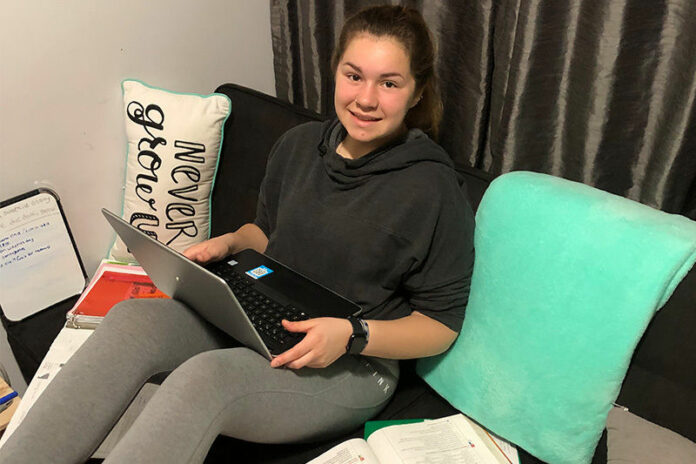As the school year ends, we asked several students to reflect on their experiences with online learning
In-person schooling ended for most west county high schoolers in late March. After spring break, school resumed but it was barely recognizable as such. Classes went online, and all sports and student activities were canceled
“Just a few months ago we went to school, and we were surrounded by 1,200 kids every single day. Now, the whole world has changed, and we only see 30 faces on the screen,” is how Analy 11th grader Julia Goldin described the shift.
Now that school is wrapping up for the year, Sonoma West asked students about what online learning was like for them. What did they like about online education? What didn’t they like? And did they feel like they actually learned anything?
A point of universal agreement: Appreciation for a more relaxed schedule
Some students liked online learning, others detested it, but everyone was happy to wake up later and not have to rush off to school in the morning.
“I do like some of the new schedule changes distance learning has provided,” El Molino junior Mackenzie Nultemeier said. “I start my school work at my leisure unless I have a Zoom class. I am not feeling stressed, getting up at 4:30 a.m. to get to swim practice and then rushing off to school by 7:30 a.m.”
Nultemeier said her mom still makes her get up and dressed by 8 a.m. — “Structure is important to her,” Nultemeier said — but it feels like a relaxed scheduled compared to her previous experience.
And it isn’t just getting up later that makes the difference: it’s haven’t control of their own schedules during the day.
“Online learning has been stressful, but also good because I’m able to get it done on my own time,” said Chandra Kouftis, a senior of Analy High School.
Nultemeier agreed.
“I really enjoy the amount of breaks I can take and the freedom I have to just check my text messages without getting my phone ripped from between my fingers,” she said. “I like being able to work with my friends and ask questions when needed.”
All in all, it made for a more relaxing learning experience.
“For me the best part has been doing my work in the comfort of my home,” Julia Schultz, an El Molino ninth grader, said. “I can have a cup of tea. I can be really relaxed and work at my own pace.”
Navigating the challenges of self-discipline and motivation
While all students liked the freer schedule, most also admitted that online education made it harder for them to structure their day and muster the motivation to make themselves study.
Some said this was exacerbated by district’s “hold harmless policy,” which meant that a student’s grade couldn’t sink any lower than it was on the day in-person classes ended. It could go up, but not down.
“With no possibility of the students’ grades going down, it has left them with no motivation,” said El Molino student Kingston Antholzner. “I have watched some of my smart, hardworking friends turn into unmotivated slobs because of this change, and I must say I do not like it.”
Many students found the accountability provided by the presence of teachers and grades hard to duplicate at home.
El Molino junior Seamus Becket, who struggles with an executive function disorder, said, “For me, the lack of physicality of school lead to greatly reduced motivation and a reduced will to create a structure for myself, which led to procrastination.”
As a result, Becket found himself farther and farther behind as the semester wore on, and he ended up turning a lot of assignments in late. Because of the hold-harmless policy, that didn’t count against him, however, for which he was grateful.
“I’ve been so happy that every day all of my teachers have been so understanding and that late work has been accepted until this Monday,” he said. “Teachers have just really understood that students are going through a lot during this period. It feels like there’s definitely a net to catch you when you slip up like I did.”
Even students who don’t struggle with a learning difficulty found motivation a challenge.
“I have always had a tendency to procrastinate, but there is no room for procrastination while doing online schooling,” said El Molino ninth grader Hayden Fields. “There are so many distractions in my home that I never had at school. When I get distracted my mom has to lead me back to my work, and make sure I have my door shut with no distractions. I don’t know where I would be without her.”
On the up side, Fields said, “This experience has taught me how to use the internet properly. I have never been as attached to the internet as my peers are. This is why this experience is so eye opening. I have to use the internet and technology everyday now, when I’d rather be riding my horse or working with my lamb.”
Learning how to deal with one’s waxing and waning motivation has been a lesson in itself.
“Some days I feel motivated to get my work done, and on others the idea of sitting at a computer with a complete lack of human contact is hard to bear,” Nultemeier said.
She said she’s tried to take it easy on herself though.
“While I value my education and the work my teachers have been putting in, I have also learned that I need to stay in tune with my mental health … Motivation, or the lack of it, easily turns into anxiety — which is something that I, especially right now, am paying a lot of attention to,” she said. “I make sure to get all of my work done, but if I have a day where I just don’t feel up to doing something, I don’t do it. I save it for the next day.”
“Online schooling, among many other things in the world right now, is based on flexibility and learning how to acclimate to a new way of getting work done,” Nultemeier said. “So why not allow yourself that flexibility to have good days and bad days?”
What works and what doesn’t in online education
Students’ experiences of what worked in online education were as varied as the students themselves. Some students appreciated the social aspect of Zoom classrooms, while others felt online education worked best for them when they were working on their own.
Several students complained that much of the online education they’d experienced this year felt like busy work.
“During this time I feel like I am not really learning anything, but rather just being kept busy because by law I am still required to be educated,” said Nultemeier. “I don’t feel I am learning at all, just staying busy.”
At Analy, senior Estrella Pacheco felt the same.
“For the most part, I feel like it’s just been overwhelming amounts of papers to fill in,” she said. “They’re assigned on Mondays and due on Fridays and it just feels like a big pile of stuff. I don’t think I’ve learned much in the process of filling in those papers, which is going to not be great later on.”
Students said they appreciated having a well-planned work week and didn’t appreciate “surprise” assignments online any more than they appreciate them in class.
“It’s really helpful to me when a teacher provides a plan for the week,” Goldin said. “I have found that I am more inclined to actively learn when I know what I’m working towards — such as a test or skills I know I will need to have next year.”
Nultemeier said, “I don’t like that some teachers just post random assignments on Google Classroom whenever they feel like it and say they are due the next day. Some post assignments at 11 p.m. and say they are due the next day or they post late on Friday evenings and say that the assignment is due Monday. This means I would have to do work over the weekend which is the two days I need a break.”
All the students said the quality of online education — like in-person education — depended on the quality of the teacher.
“Some of my teachers are very kind and offering to help with any and every subject, if needed — even if they don’t teach them. Other teachers are just overloading us with as much work as they can handle grading,” Nultemeier said.
Analy’s Goldin said, “Some teachers have a better grasp of online education than others. Zoom office hours, for example, provide much more help than a Zoom class where a teacher goes through a series of slides that wouldn’t have gotten kids’ attention even if we were in a classroom.”
“There are a few teachers who’ve done a really good job, but most of our teachers are not prepared,” Pacheco said. “They’ve not been trained to teach online classes. I personally feel like it would have been beneficial for us to move to a more project-based learning so that we could research things on our own and put what we learned on Google Slides and turn those into the teacher.”
Finally, some subjects seemed to lend themselves easier to online education than others.
El Molino’s Becket said, “Math lent itself best to self-directed study and allowed the teachers to spend her time helping people with what they actually needed help with.”
AP US History, which already had an online component to it, also worked well, he said.
“All of our preparation for the AP test was online, meaning we could get direct feedback on our progress, both on the documents and in class.”
So which did students prefer — online or in-person education?
All of the students we spoke with preferred in-person schooling to online education.
“Since we’ve begun online learning, I can’t say school has felt as productive as it was before,” Antholzner said. “There’s less social interactions with our peers, the work load has been significantly reduced, and the whole thing just feels unnecessary and unproductive. There’s barely been any new material outside of a select one or two classes, and because of trolls who don’t care about learning, the whole experience is ruined even further.”
Pacheco disliked online education so much that she said if the district decides to continue online education in the fall, “I’ve decided to look and see what my other options are.”
And Nultemeier is even missing getting up at 4:30 a.m. for swim practice.
“I am a social person, and I need interaction with people,” said Nultemeier. “It’s very distressing to be stuck in a box. Working out has helped me, but it’s not enough. I am someone who enjoys spending time with my friends, so this social distance and quarantine has really been difficult to deal with.
“Overall, as someone who never really liked school in the first place, I surprisingly really miss being on the school campus,” she said. “Personally, I cannot wait to have school back in session with real people and not a glitchy Zoom class. I have a bigger appreciation for my school community, my friendships, my health and my education more than ever before.”









